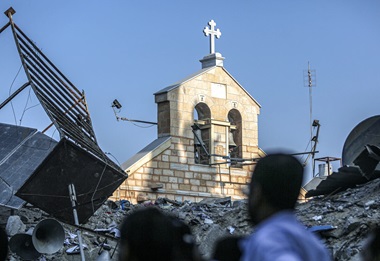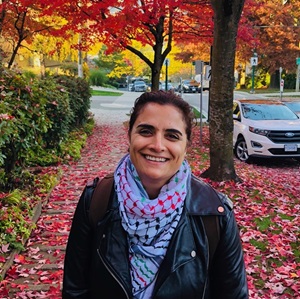
St. Porphyrius Greek Orthodox Church in Gaza.
As a Palestinian Christian living in Vancouver, I find myself inhabiting multiple realities during the unfolding devastation in Gaza.
While recent ceasefire negotiations have brought hope through the reunion of Israeli hostages and Palestinian prisoners with their families, history shows us that the path to lasting peace requires deeper engagement with difficult truths.
As access opens to previously blocked areas, we anticipate discovering the full extent of the destruction and countless stories of suffering that have been hidden from those who want to know.
In moments like these, my faith compels me to wrestle with difficult questions about how we read and interpret scripture in times of crisis. In my research on theological conversations between Palestinian and Indigenous understandings (Qubti 2023), I found profound parallels in how both communities grapple with biblical interpretation.
Native American scholar Robert Allen Warrior’s (Osage) seminal 1989 essay ‘Canaanites, Cowboys and Indians’ offers a critical perspective on how liberation theology often uncritically applies the Exodus narrative. Warrior points out that while we celebrate God as deliverer in this story, we must also wrestle with the impact on the Canaanites – drawing parallels between their experience and contemporary communities facing displacement, from Indigenous peoples to Palestinians in Gaza.
Palestinian liberation theologian Naim Ateek, writing in the same year, raised similar concerns about how biblical interpretation can either perpetuate suffering or promote justice for all peoples. Their parallel critiques challenge us to read scripture more carefully, considering how our theological interpretations impact real communities today.
As someone shaped by both Palestinian and Christian identities, I’ve witnessed how Christian institutions in Gaza have long embodied Christ’s call to serve all people regardless of faith.
The Al-Ahli Hospital, built by the Christian Mission Society and now operating under the Anglican Diocese of Jerusalem, has for generations been a testament to Christian service. According to the World Council of Churches and the American Friends of the Episcopal Diocese of Jerusalem (AFEDJ), this institution has provided critical medical care to all communities in Gaza regardless of faith or ability to pay.
The recent damage to these institutions raises profound questions about our responsibility as Christians to support humanitarian work in Israel and Palestine.
The current situation presents three crucial challenges to Christian witness:
First, our commitment to Christian service is at stake. When institutions built for healing and education face destruction, we must ask ourselves: How will future generations view our response? Jesus taught that we will be judged by how we treat “the least of these” (Matthew 25:40). This calls us to consider how we can best support humanitarian efforts that serve all people in Israel and Palestine.
Second, we must engage thoughtfully with scripture and prophecy. While many Christians hold different interpretations about chosenness and promised land, especially in regards to the Israeli-Palestinian context, we share a common mandate to pursue nonviolent peace and justice. Both theologians Ateek and Warrior demonstrate how powerful nations have used biblical texts to justify the displacement of Indigenous peoples and Palestinians. Their work calls us instead to read scripture through a lens that affirms God’s love for all peoples and envisions a future where all can live together in peace, regardless of ethnic identity. This theological vision aligns with Christ’s teaching of radical inclusion and love for all.
Third, we must consider the future of Christian witness in Israel and Palestine. The region where Christianity was born has seen its Christian population decline significantly. According to the World Council of Churches, the Christian presence in Gaza has diminished to a small but resilient community. How do we support these fellow believers while working toward peace for all?
The recent ceasefire has enabled the reunion of families separated by violence – Israelis welcoming their loved ones taken from their homes on October 7, and Palestinians embracing family members detained without charges under administrative detention (B’Tselem).
These moments of human connection remind us that behind the headlines are real people, all made in God’s image. However, even as attention focuses on Gaza, escalating violence in the West Bank threatens Palestinian communities, including Christian presence in cities like Bethlehem, Ramallah, Jenin and Zababde. This reminds us that a ceasefire in Gaza alone is insufficient for achieving lasting peace.
As Christians, we are called not just to pray but to act wisely and compassionately. We can:
- Study scripture with attention to how our interpretations impact real communities, particularly in Israel and Palestine.
- Build relationships with Palestinian Christians to understand how our brothers and sisters in Christ’s birthplace maintain their faith amid suffering.
- Support Christian ministries like Al-Ahli Hospital that reflect Christ’s healing ministry in Gaza.
- Join Christian peace initiatives that promote reconciliation and understanding between Palestinians and Israelis.
- Invite Palestinian Christians to speak at your churches and gatherings to hear their stories and learn how to support them and their families.
- Examine how your churches can better reflect Christ’s love for all people in your response to this critical moment.
As we inhabit these multiple realities of destruction and hope, of separation and reunion, of prayer and action – may we have the wisdom to move beyond simple answers toward thoughtful engagement. Christ’s blessing of peacemakers isn’t just a comfort; it’s a call to action.
While the current ceasefire offers a moment of hope, those who want to know must continue to witness, to speak and to act. Our commitment to the peoples of Israel and Palestine – all made in God’s image – requires us to work toward the deeper truths that make a just and lasting peace possible.
For further reading:
Academic work:
- Shadia Qubti’s ‘A Theological Conversation between Palestinian and North American Indigenous Understandings of Land‘ (2023)
- Robert Allen Warrior’s ‘Canaanites, Cowboys and Indians‘ (1989)
- Naim Ateek’s Justice and Only Justice: A Palestinian Theology of Liberation (Orbis Books, 1989)
Current situation reports:
- UN OCHA’s latest updates on Gaza and the West Bank
- B’Tselem’s reporting on administrative detention
- Christian Peacemaker Teams’ documentation of attacks on religious sites
Church organizations:
- World Council of Churches news and statements
- American Friends of the Episcopal Diocese of Jerusalem updates on Al-Ahli Hospital
- Anglican Diocese of Jerusalem reports
- Middle East Council of Churches reports

Shadia Qubti
Shadia Qubti focuses on outreach, community building, networking and social justice activities as Community Engagement Animator at Trinity Grace United Church in Vancouver.
Her education includes International Relations and English Language at Hebrew University in Jerusalem, Conflict Resolution and Nonviolent Action at Trinity Dublin College and an MA in Interreligious and Indigenous Studies at Vancouver School of Theology.
She has posted this comment on this site as a member of The Bell: Diverse Christian Voices in Vancouver. Go here to see earlier comments in the series.

Excellent, thank you! New book: Christian Zionism – A Deconstruction. Alex Posoukh. Amazon.